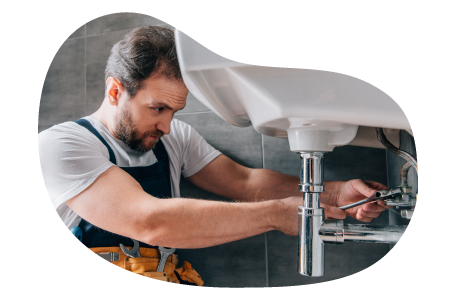
Why do plumbers need insurance?
Every project introduces liability. An employee could sustain an injury while soldering pipes, or a customer could sue over damage from a leaky water heater. The right insurance coverage for plumbers helps you recover quickly from losses. Some policies, like workers' comp, may be required by law.

Find affordable coverage
Plumbers can save money by comparing customized quotes from top insurance companies.
Fill out Insureon's easy online application to get free quotes and advice from a licensed insurance agent.
What types of business insurance do plumbers need?
These insurance policies cover the most common risks of plumbing.
General liability insurance
General liability insurance covers third-party risks, such as damage from a pipe carried in a customer's home. Bundle it with commercial property for savings in a business owner's policy (BOP).
- Legal fees from third-party accidents
- Product liability coverage
- Personal injuries and advertising injuries
Business owner's policy
A BOP bundles general liability coverage and commercial property insurance at a discount. It's often the most cost-effective type of insurance for plumbers.
- Medical bills from client injuries
- Client property damage
- Damage to your building or its contents
Workers’ compensation insurance
Most states require a workers' comp policy for plumbing businesses with employees. It also protects sole proprietors from work-related medical costs that health insurance might deny.
- Employee medical expenses
- Disability benefits
- Employer's liability coverage
Commercial auto insurance
This auto policy covers bodily injuries and property damage caused by a plumber’s vehicle. Each state has its own auto liability insurance requirements.
- Property damage caused by your vehicle
- Auto accident injuries
- Vehicle vandalism and theft
Contractor’s tools and equipment insurance
This policy helps pay for repair or replacement of a plumbing contractor's pipe cutters, blowtorches, and other tools and equipment. It's a type of inland marine insurance.
- Tools less than five years old
- Equipment valued at less than $10,000
- Items that travel to jobsites
Professional liability insurance
Professional liability insurance helps cover legal costs when a plumber is sued for late, incomplete, or negligent work. It's also called errors and omissions insurance (E&O).
- Undelivered services
- Work errors and oversights
- Professional negligence
How much does plumber's insurance cost?

A contractor who works alone will have a smaller insurance premium than a larger plumbing company.
Factors that affect plumbing insurance costs include:
- Services offered, such as residential plumbing or public utility work
- Business property and equipment
- Business income
- Claims history
- Types of insurance purchased
- Coverage limits, deductibles, and exclusions
How do I get insurance for plumbers?
It's easy to get plumbing business insurance and surety bonds if you have your company information on hand. Our application will ask for basic facts about your company, such as revenue and number of employees. You can buy a policy online and get a certificate of insurance with Insureon in three easy steps:
- Complete a free online application
- Compare insurance quotes and choose policies
- Pay for your policy and download a certificate
Insureon's licensed agents work with top-rated U.S. insurers to find the most affordable insurance and surety bonds that fit your plumbing business, whether you're a contractor, subcontractor, or employer.
Verified business insurance reviews
Hear from customers like you who purchased small business insurance.
Common questions about insurance for plumbers
Review answers to frequently asked questions about plumbing insurance policies.
Do I need a license, permit, or bond for my plumbing business?
Most states and municipalities require plumbers to be licensed, as well as carry certain types of insurance and bonds.
Even in states that don’t require plumbing contractors to be licensed, you might still need a license at the local level to work as a plumber.
In most cases, you’ll likely have to have a high school diploma or GED, and work for about four to five years in a plumbing apprenticeship, before you're eligible to take a licensing exam within your state.
Beyond licensure, having proper permits shows you run a legitimate, reputable business, which can be important to prospective clients when you're looking to bid on plumbing jobs. Buying insurance and bonds also helps reassure clients that they won’t be held liable for damages if something goes wrong during a costly project.
Some insurance and bonds are often required by your state and local government, like workers' compensation, commercial auto, or various types of surety bonds.

What other types of coverage do plumbers need?
While general liability insurance and workers' compensation provide crucial protection against workplace injuries and third-party claims, they don't cover every risk. Plumbers should also consider the following types of coverage:
- Builder's risk insurance: Builder's risk provides coverage for a structure under construction and materials like pipes and PVC glue at a work site. It's sometimes called course of construction insurance.
- Commercial property insurance: This policy covers your building and its contents, such as tools, furnishings, and computers. It protects against financial losses from fires, storms, and burglaries.
- Business personal property (BPP) coverage: You can add this endorsement to your general liability policy to protect business property kept at a designated location, though you may not have a building.
- Inland marine insurance protects a plumber's tools and equipment in transit, stored off-site, or at a jobsite. Common types of inland marine insurance include contractor's tools and equipment insurance, which provides protection for newer items valued at less than $10,000, and installation floater insurance, which covers materials being installed or built by a contractor during a project.
- Commercial umbrella insurance: Umbrella insurance boosts the coverage on your general liability, commercial auto, and employer's liability insurance once the policy limit is reached.
Does my plumbing business need professional indemnity insurance?
Professional indemnity insurance, also called professional liability insurance, protects your plumbing company from claims of errors, mistakes, or negligence that negatively impacted your client.
Businesses usually aren't required by state laws to carry plumber liability insurance. However, it's particularly useful for businesses that primarily sell their industry expertise.
Let's say a plumber incorrectly diagnoses a slab leak within a home. The customer could sue the plumbing business for the cost of fixing the water damage, including flooring repairs, new pipes, and mold remediation.
Claims protected by professional indemnity insurance include:
- Professional negligence
- Breach of contract
- Oversights and errors
- Breach of confidentiality
- Inaccurate professional advice
- Missed deadlines and undelivered services
No matter how careful you try to be, human error is inevitable, and the out-of-pocket costs associated with legal action can be expensive. Having the right professional liability insurance policy can protect your business in the event of an unsatisfied customer lawsuit.
